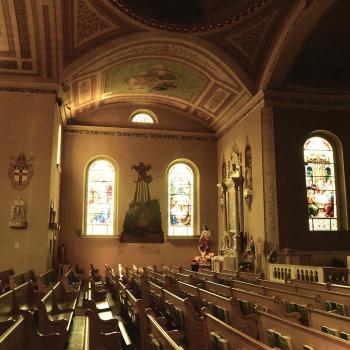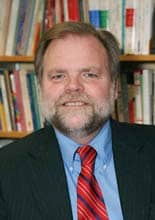Life involves the dynamic interplay of chronos and kairos, evenly-moving clock time and lively moments of creative transformation. Just as there are "thin places," places where divine energy opens the door to new possibilities, there are also "thin times," moments in which God's vision awakens us to holiness amid the quotidian endeavors of life. Plato once described time as the "moving image of eternity" and surely New Year's points to holiness amid change, to the dynamic nature of reality in which we can't step in the same waters once, much less twice; in which life, like God's mercies, is new every morning.
Although New Year's Eve and New Year's Day have no recognized place in the liturgical calendar, some churches mark the coming of the New Year with "watch night" services, times of confession and hopefulness, recalling the faithfulness of God through all the seasons of life. Yet, holistic spirituality recognizes that the secular is really the sacred in disguise. If God is omnipresent, as theologians throughout the ages have affirmed, then all times and places are holy, though some may be set apart as special by divine or human intentionality. And, so we must keep watch for divine movements in ordinary time.
In the spirit of the Christmas carol, "O Little Town of Bethlehem," we can affirm that at the turning of the year, "the hopes and fears of all the years are met in thee tonight." And, this year, we have many hopes and more than a few fears. Just a few weeks ago, my department at the seminary was restructured and my position as Director was eliminated. This has led to more than a few anxious moments as well as ruminations about the next steps in my personal and professional life. Given the scarcity of appropriate academic and congregational settings, I wonder if the year ahead will bring a new position in a new community, a local pulpit, or a variety of "cottage industries" to support my family. I ponder the "worst case" scenarios as well as wondrous possibilities.
I know that I am not alone in such ruminations; I also know that my economic situation is more comfortable than most job hunters. Beyond that, many of us wrestle with feelings of hopelessness as we observe the ongoing national political gridlock, and the foolishness of partisanship and nay saying in a time of national and planetary crises. We despair at government policies that reward wealth and punish vulnerability, and wonder when "Christian" politicians will read their Bibles in light of the all-pervasive and unmistakable biblical call to care for the least of these and the stranger in our midst.
Alfred North Whitehead once noted that higher organisms initiate novelty to match the novelties of the environment. In many ways, this is what New Year's is about—the quest for new behaviors, new attitudes, and new visions to mirror the coming of a new year. The New Year's resolutions, even when they last only a few days, remind us that we can be transformed; that we can become new creations; that we don't have to live by business as usual but can see our lives in a new way. The impact of past and present need not imprison us; we have the freedom to shape our attitudes, first, and then our behaviors. Behold God is doing a new thing and so can we!
Those twelve midnight New Year's kisses remind us that we can love more fully in the year ahead; they remind us how precious our loved ones are to us; they open our hearts to speak words of love boldly and frequently. We can open our eyes and see loved ones anew—as flesh and blood, anxious, hopeful, and loving as best as they can; as bone of our bone and flesh of our flesh, yet unique in the whole universe.
While celebration is in order at New Year's, the turning of the year is also an opportunity for reflection, gratitude, and transformation. With Vietnamese Buddhist monk Thich Nhat Hanh, we can breathe in the New Year, opening to the totality of our feelings and experiences. As we breathe in, we can accept the fullness of our experience, including a divine peace that passes all understanding. We can listen for a quiet voice of possibility amid the welter of experience; a still small voice, whispering in sighs too deep for words, calling us to adventure and transformation. We can take time, as we should each day, to give thanks. As Dag Hammarksjold counseled:
For all that has been—thanks.
For all that shall be—yes!
Gratitude opens the door to appreciation, inspiration, and openness to the future. The great "yes" we proclaim is not assent to injustice, global climate change, racism, sexism, homophobia, and consumerism. It is a "yes" to God's life moving through all things, calling us forward to changed lives and changed communities. With the Hebraic tradition, New Year's is the call to choose life moment by moment amidst our responsibilities to our communities and the planet. Death holds too much power in our lives; but love casts out the fear and embraces abundant life for us and for all creation. Gratitude and appreciation open us to life-transforming love.





